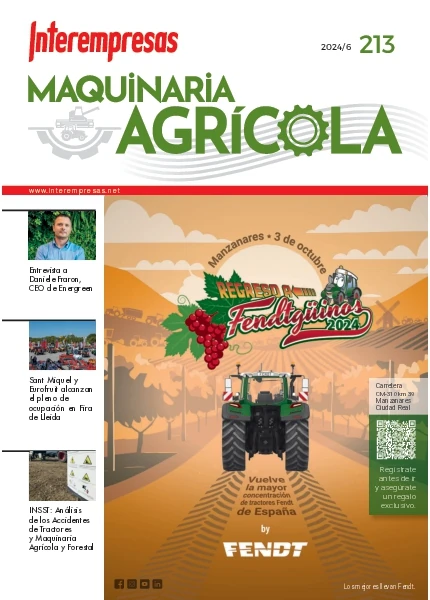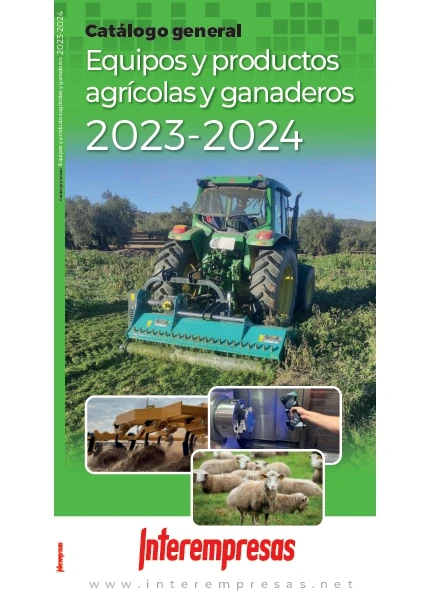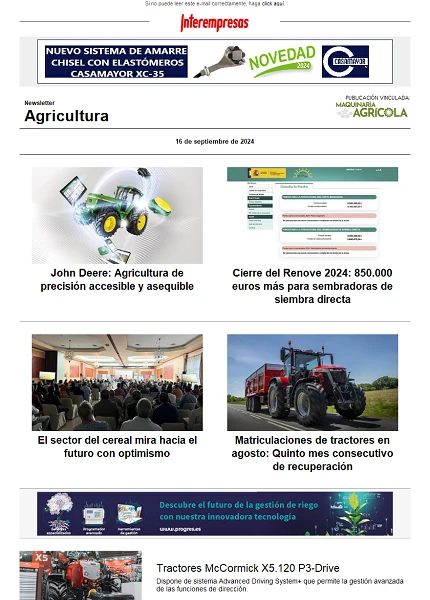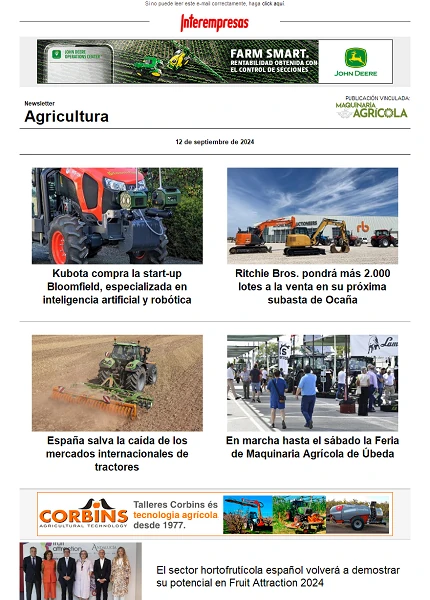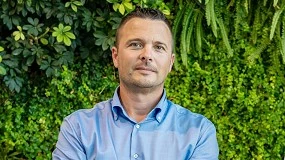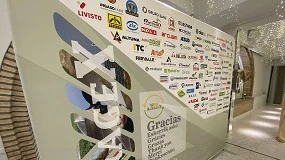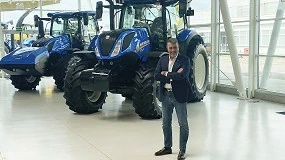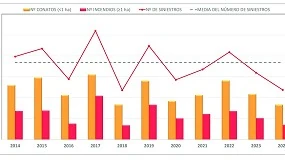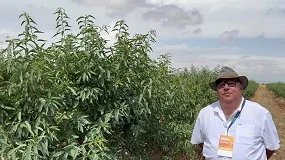Valladolid contará con la planta de compostaje a base de lodos más grande de Europa
6 de mayo de 2009
La empresa Biocompostajes Españoles (Bicoe), empresa dedicada al reciclaje de lodos de depuradoras y materia orgánica procedente de residuos urbanos e industriales, está a punto de finalizar la instalación de la que será la planta de compostaje aeróbico más grande de Europa, ubicada en la localidad vallisoletana de Velascálvaro. Un proyecto en el que participan a nivel particular, Casimiro y José Antonio Martínez, los dos hermanos propietarios de Casimiro Máquinas, con una inversión valorada en once millones y medio de euros.
Con su inauguración prevista para primeros de julio, esta planta permitirá obtener abono para la agricultura. de hecho, está previsto ubicar la planta sobre una superficie de unos 90.000 metros cuadrados. capaz de procesar unas 300 toneladas diarias de lodos, lo que supone unas 80.000 toneladas por año, tendrá capacidad para reciclar los lodos producidos en las depuradoras situadas en un amplio radio de acción de dicha planta. además, generará una producción de compost de unas 32.000 toneladas anuales que podrán aplicarse para regenerar los suelos de la zona sur de Valladolid y norte de Salamanca y Ávila.
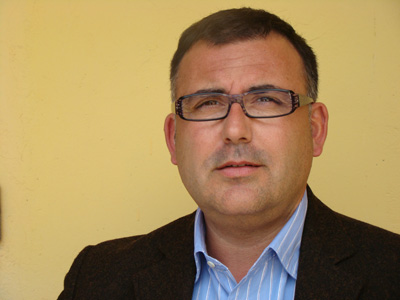
Bicoe empleará, para el tratamiento de los lodos, una técnica estadounidense, innovadora en España pero ya implantada en Europa que, por sus ventajas, permitirá descartar las demás técnicas ya conocidas de compostaje tradicional.
Este sistema se basa en una tecnología de digestión aeróbica en túneles cerrados los cuales, mediante aireación forzada, permiten un control del proceso en la matriz del compostado.
Actualmente, los lodos se tiran directamente sobre los terrenos sin tratar ni eliminar las sustancias tóxicas, generando malos olores, y contaminado los acuíferos. Además, el transporte se realiza en camiones normales y en remolques agrícolas sin garantizar que el proceso se realice correctamente.
En cambio, mediante digestión aeróbica en túneles, el lodos se trasforma en compost de alta calidad para poder ser utilizado en el campo sin contaminar.Y Bicoe se encargará de transportar los lodos desde las depuradoras hasta la planta en camiones-contenedores, ajunstándose a la normativa vigente.
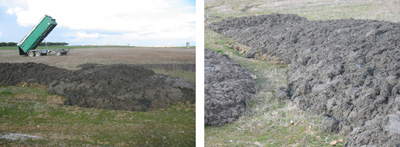
Ventajas del sistema Bicoe Ambiente controlado
- Los lodos no son afectados por la lluvia
- El viento no seca o difunde el material
- Las pérdidas son minimizadas y contenidas
- Contención del olor
- Problemas de volatilidad minimizados
- El sistema ofrece una contención ideal para compost maduro
- Ningún problema de proximidad con otras actividades
Control del proceso:
- La temperatura es controlada a través del flujo del aire
- La humedad es mantenida a través de ventilación y el control de líquidos
- El porcentaje de carbono/nitrógeno es regulado durante la mezcla
- La compactación es controlada durante el proceso
Aplicaciones del compostaje
Una de las características más atractivas del compostaje es que existe un mercado para este producto: entre los compradores potenciales se incluyen los propios municipios que originan residuos, los agricultores que practican agricultura ecológica, horticultura más o menos intensiva, fruticultores, particulares que poseen viviendas con jardín, dueños de pastizales, operadores de campos de golf y propietarios de viveros. El precio del compost varía considerablemente en función de las características, envasado y calidad, materiales de partida utilizados y destino del producto terminado, puesto que aún hoy en día, se le considera como un producto residual en unos casos o como producto de lujo en otros.
En climas áridos, el compost tiene un valor extra como elemento favorecedor de la conservación de suelos y clave en la lucha contra la erosión
Las aplicaciones se dirigen masivamente a venta en agricultura, destino tradicional de los productos compostados. Además es en este sector donde se detecta una necesidad de materia orgánica y nutrientes N-P-K mayor. Actualmente es conocido que el aporte de materia orgánica aporta ventajas que van más allá de la simple mejora de la producción.
Bicoe registrará su producto final con su etiquetaje y desarrollará una cadena de aplicación final y distribución en el campo.
Los suelos de la zona sur de Valladolid y norte de Salamanca y Ávila, por la sobreexplotación a la que han sido sometidos en los últimos años, se encuentran carentes de materia orgánica y cargados de abonos químicos y fitosanitarios.
La utilización de compost supone una oportunidad de regeneración de estos suelos, en minerales tan importantes como el nitrógeno, fósforo, potasio, calcio y magnesio, aumentando así su fertilidad y mejorando considerablemente su productividad.
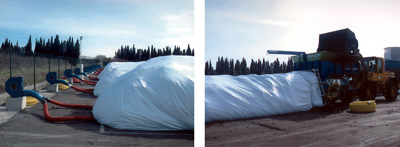
El proceso de obtención del compostaje
Los lodos procedentes de las depuradoras, tanto urbanas como industriales - y dentro de éstas ultimas especialmente las alimentarias- contienen un porcentaje importante de materia orgánica que puede ser reutilizada. Uno de los procesos que pueden permitir un aprovechamiento menos problemático de estos lodos será mediante la realización de un compostaje de los mismos previo a su disposición final. El compostaje de lodos de depuradora produce efectos similares a los compostajes realizados sobre otros materiales que contienen materia orgánica. Es decir, el compostaje es un proceso biológico aerobio que, bajo condiciones de aireación, humedad y temperaturas controladas y combinando fases mesófilas (temperatura y humedad medias) y termófilas (temperatura superior a 45 °C), transforma los residuos orgánicos degradables, en un producto estable e higienizado, aplicable como abono o sustrato.
Es una técnica de estabilización y tratamiento de residuos orgánicos biodegradables. El calor generado durante el proceso (fase termófila) va a destruir las bacterias patógenas, huevos de parásitos y muchas semillas de malas hierbas que pueden encontrarse en el material de partida, dando lugar a un producto higienizado. Es una técnica biológica de reciclaje de materia orgánica que al final de su evolución da humus, factor de estabilidad y fertilidad del suelo.
Y el sistema Bicoe cierra el ciclo natural de reciclaje: se encargará de transportar los lodos desde las depuradoras hasta la planta en camiones-contenedores, ajustándose a la normativa vigente. A su llegada a la planta, los lodos serán pesados, analizados y valorados para sus diferentes caracterizaciones. Se descargarán en la nave de melaje, donde una máquina mezcladora los envuelve con restos de biomasa, astillaje o desechos de poda verde (en el proceso de melaje se volatiliza el 10% de la mezcla). Cabe destacar que la nave está equipada con unos filtros Scruber que filtran constantemente el aire y neutraliza el olor. Esta mezcla es transportada hasta los túneles de fermentación.


